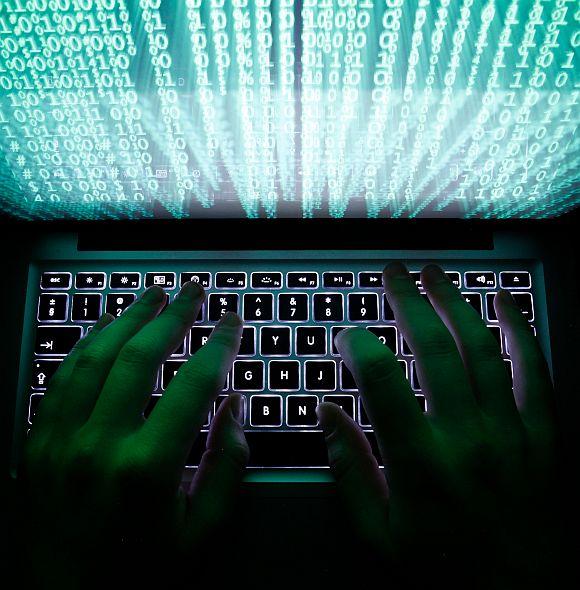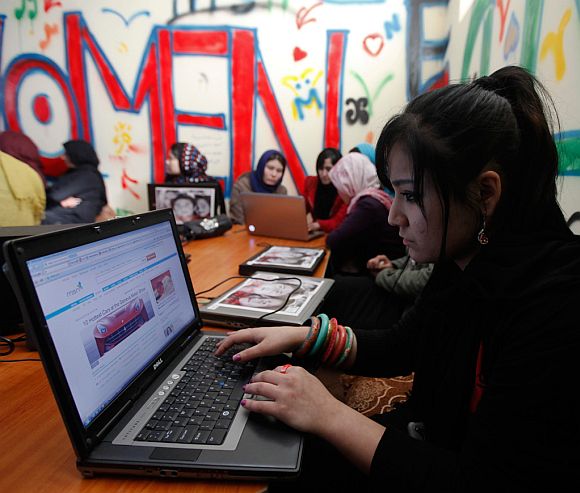 | « Back to article | Print this article |
Will India go dirty like US on cyber snooping?
India may have security concerns on its mind as it prepares to roll out its own version of an Internet spying programme. But activists are concerned about its misuse. Vicky Nanjappa reports
Even as United States battled to make amends following the global outrage over the secret Internet spying programme, codenamed PRISM -- leaked to the media by whistle-blower Edward Snowden -- India is getting ready to roll out its own cyber snooping agency called the National Cyber Coordination Centre.
New Delhi has been concerned over reports on PRISM, which gives the US agencies access to almost everything that anyone is doing online. Worse, India figures fifth in the list of most-snooped countries online.
India’s NCCC is similar in nature, but agencies assure that there would be absolutely no invasion to privacy and the necessary safeguards will be taken.
The primary job of the NCCC is to carry out a real-time assessment of cyber security threats and also provide actionable reports.
An officer working with the programme told rediff.com that the nature of India’s programme is largely to do with the analysis of meta data; it would not involve watching content.
However, based on the analysis and also the large manpower monitoring the Internet, any suspicious flow of activity will raise a flag.
Click on NEXT to read further...
Will India go dirty like US on cyber snooping?
“We face a major problem on the Internet space today. Our systems have been hacked in the past. Because we have been in a reactionary mode, it becomes important to roll out such a programme which could prevent an attack,” the officer said.
The NCCC team would ensure that critical data belonging to individuals would not be watched unless it aroused suspicion.
Allaying fears of misuse, the government is taking steps to ensure that there is accountability and has named the Department of Electronics and Information Technology as the nodal agency.
Besides this there would also be in place a National Cyber Coordination Centre which would oversee the operation. The defence ministry, National Technical Research Organisation and the Defence Research and Development Organisation will be part of this programme.
Click on NEXT to read further...
Will India go dirty like US on cyber snooping?
The government appears to have finally realised that it desperately needs the participation of the private sector in such a venture
With the number of cyber attacks on the rise, the government has clearly shown that it is incapable of handling such attacks. It does propose to rope in ethical hackers from the private sectors in order to curb the problem. A law to protect such persons is most likely to come under the witness protection act.
Data reveals that there have been 42 million Indians affected due to hacking in the past one year and the loss is estimate to be at around $7 billion. In order to provide a safe environment on the cyber space, India needs nearly 3 lakh ethical hackers.
However, activists are not convinced. They say that as per the recently-unveiled cyber policy, the government agency gets access to all Internet accounts, social media and blogs.
In addition to this the programme of the government, which falls under the Central Monitoring System, would also have access to phone calls and text messages. The government could access all such data without the approval of the service provider.
There is a good chance of the agencies targeting human right activists, journalists and also political opponents.
Click on NEXT to read further...
Will India go dirty like US on cyber snooping?
Activists allege that there are no proper checks and balances in place.
Although there is a nodal agency, there is no proper definition given by the government as to what is suspicious activity on the internet. There have been a couple of incidents in the past in which persons writing anti-government messages on social networking sites have been targeted, say activists.
However, an Intelligence Bureau official says the primary issue on hand is to ensure safety.
Hackers from Pakistan and China have easily managed to hack into 294 very important government websites and this has led to some amount of data being compromised. There have also been over 800 incidents in which websites have been defaced apart from the 8000-odd emails of government employees that have been hacked.
India’s biggest threat comes from Pakistan and China in the form of the Pakistan Cyber Army, Mission Luckycat and the H4TR ck. While Pakistan has been more destructive in nature by defacing websites, Chinese hackers have snooped on crucial information in the defence space.
Top PHOTO features of the week
Click on MORE to see another set of PHOTO features...




